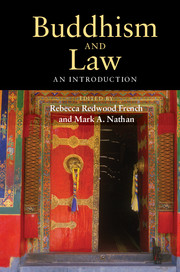Book contents
- Frontmatter
- Dedication
- Contents
- Maps and Illustrations
- Contributors
- Preface
- Abbreviations
- Introducing Buddhism and Law
- Part I The Roots of Buddhism and Law in India
- Part II Buddhism and Law in South and Southeast Asia
- 6 Buddhism and Law in Sri Lanka
- 7 Flanked by Images of Our Buddha
- 8 The Legal Regulation of Buddhism in Contemporary Sri Lanka
- 9 Pāli Buddhist Law in Southeast Asia
- 10 Genres and Jurisdictions
- Part III Buddhism and Law in East Asia
- Part IV Buddhism and Law in North Asia and the Himalayan Region
- A Selection of Readings
- Index
- References
6 - Buddhism and Law in Sri Lanka
Published online by Cambridge University Press: 05 August 2014
- Frontmatter
- Dedication
- Contents
- Maps and Illustrations
- Contributors
- Preface
- Abbreviations
- Introducing Buddhism and Law
- Part I The Roots of Buddhism and Law in India
- Part II Buddhism and Law in South and Southeast Asia
- 6 Buddhism and Law in Sri Lanka
- 7 Flanked by Images of Our Buddha
- 8 The Legal Regulation of Buddhism in Contemporary Sri Lanka
- 9 Pāli Buddhist Law in Southeast Asia
- 10 Genres and Jurisdictions
- Part III Buddhism and Law in East Asia
- Part IV Buddhism and Law in North Asia and the Himalayan Region
- A Selection of Readings
- Index
- References
Summary
Introduction
In this chapter I explore the interrelationships between Buddhism as a sociocultural institution and the laws of Sri Lanka. Let me first orient the reader to the spatiotemporal trajectory of this relationship and then examine its historical vicissitudes. Sri Lanka is an island nation situated about forty miles southeast of the Indian peninsula. The island has been inhabited from very ancient times and appears prominently in the great South Asian epics, such as the Ramāyana. Historical information is available from the Sri Lankan Buddhist chronicles and from various archeological sources. According to the fourth century CE Buddhist chronicle Dīpavaṃsa and the sixth century CE chronicle Mahāvaṃsa, the capital city of Anurādhapura, was established in the fifth century BCE, and a Theravāda Buddhist monastic order was established by an Indian bhikkhu named Mahinda in the third century BCE. During the reign of King Devānampiyatissa (250–210 BCE), a substantial portion of the population of the kingdom formally accepted Buddhism as their faith. Anurādhapura became the primary stage for the early Buddhist engagements with the law of the land, setting many precedents that are still valid to this day.
The Buddhist community or the buddhasāsana in Sri Lanka consists of two basic groups, namely pavidi (monastic) and gihi (lay). The pavidi have a legal system, the Vinaya, for the maintenance of discipline in the monastic institution that outlines the formal rules governing monastic conduct involving both injunctions and punishments. Although the Vinaya has no direct authority over the gihi, it indirectly influences the lay population by setting informal customs for proper social conduct. Lay social ethics and etiquette, ranging from proper procedures for partaking of meals to observance of etiquette in maintaining social relations and cleanliness, can be traced to the Vinaya rules, and violating them can result in general opprobrium, open criticism, and even ostracism.
- Type
- Chapter
- Information
- Buddhism and LawAn Introduction, pp. 116 - 134Publisher: Cambridge University PressPrint publication year: 2014



